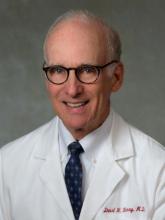Thursday, May 23, 2019
Episode 17:
David L. Streiner, PhD, of McMaster University, Hamilton, Ont., and the University of Toronto, joins Blood & Cancer host David Henry, MD, of Pennsylvania Hospital, Philadelphia, to talk hazard ratios and P values as they examine the clinical relevance of findings from a phase 3 trial.
In Clinical Correlation, Ilana Yurkiewicz, MD, of Stanford (Calif.) University, talks about how to balance family versus patient preferences.
Show notes
By Emily Bryer, DO, resident in the department of internal medicine, University of Pennsylvania, Philadelphia
- A phase 3 trial is a randomized, controlled trial testing a new intervention against placebo or treatment as usual.
- Randomization maximizes the chances that the groups are equivalent but does not guarantee it.
- With randomization, you also are accounting for variables that are unknown and/or cannot be controlled for.
Phase 3 trial discussed by Dr. Henry and Dr. Streiner:
- AURELIA trial: Bevacizumab plus chemotherapy vs. chemotherapy alone for platinum-resistant ovarian cancer.
- Inclusion criteria: Ovarian cancer that has progressed on a platinum-based therapy.
- Randomization: 361 patients randomized 1:1 to receive bevacizumab plus chemotherapy versus chemotherapy alone.
- Primary endpoint: Progression-free survival (PFS).
- Main outcome: PFS had a hazard ratio 0.48 (95% confidence interval, 0.38-0.60).
- A hazard ratio of 0.48 means that patients in the experimental group had half the risk of experiencing a bad outcome (progression) than patients in the comparison group did.
- The hazard ratio includes a confidence interval (CI) at the end of the value because it is an estimate. The CI represents where the true hazard will fall 95% of the time. If 1.0 is included in the range, then the result is not statistically significant, and the events could have happened by chance.
- An ad hoc analysis is conducted at the end of the study.
- It is not a prespecified statistical idea.
- It is thought provoking and hypothesis generating but not conclusive.
Reference:
AURELIA trial: J Clin Oncol. 2014;32(13):1302-8.
How to Listen
Podcast Participants
David Henry, MD, FACP, is a clinical professor of medicine at the University of Pennsylvania and vice chairman of the department of medicine at Pennsylvania Hospital in Philadelphia. He received his bachelor’s degree from Princeton University and his MD from the University of Pennsylvania, then completed his internship, residency, and fellowship at the Hospital of the University of Pennsylvania. After 2 years as an attending in the U.S. Air Force, he was drawn to practicing as a hem-onc because of the close patient contact and interaction, and his belief that, win or lose with each patient, one can always make a difference in their care and lives. Follow Dr. Henry on Twitter: @davidhenrymd. Dr. Henry reported being on the advisory board for Amgen, AMAG Pharmaceuticals, and Pharmacosmos. He reported institutional funding from the National Institutes of Health and FibroGen.

